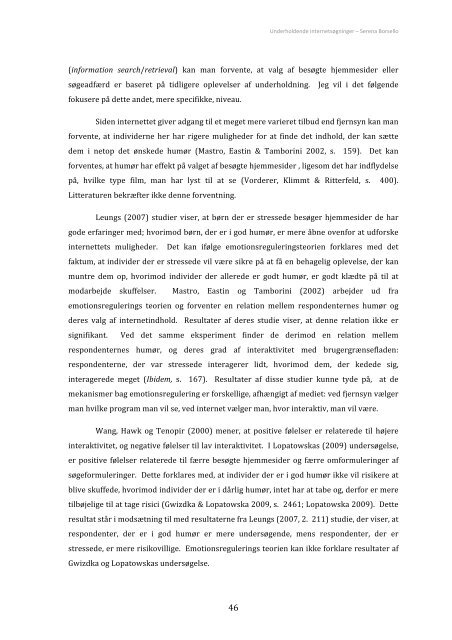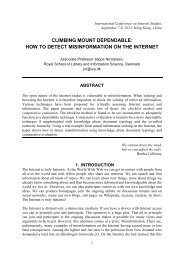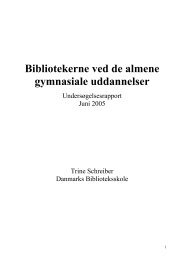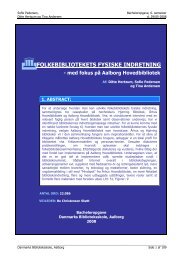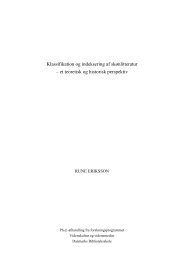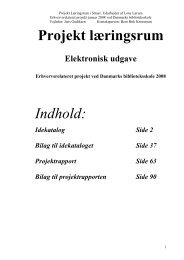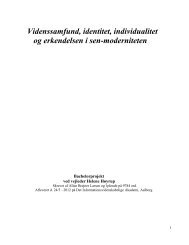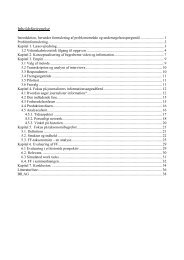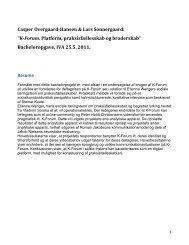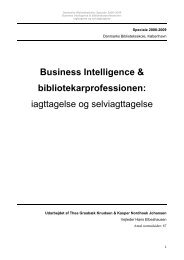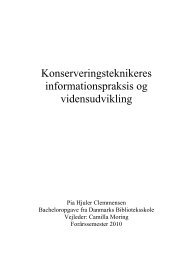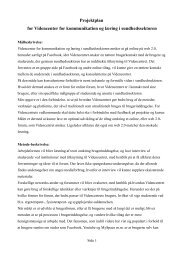Hvorfor er det sjovt at surfe på nettet? - Forskning
Hvorfor er det sjovt at surfe på nettet? - Forskning
Hvorfor er det sjovt at surfe på nettet? - Forskning
Create successful ePaper yourself
Turn your PDF publications into a flip-book with our unique Google optimized e-Paper software.
46<br />
Und<strong>er</strong>holdende int<strong>er</strong>netsøgning<strong>er</strong> – S<strong>er</strong>ena Borsello<br />
(inform<strong>at</strong>ion search/retrieval) kan man forvente, <strong>at</strong> valg af besøgte hjemmesid<strong>er</strong> ell<strong>er</strong><br />
søgeadfærd <strong>er</strong> bas<strong>er</strong>et <strong>på</strong> tidlig<strong>er</strong>e oplevels<strong>er</strong> af und<strong>er</strong>holdning. Jeg vil i <strong>det</strong> følgende<br />
fokus<strong>er</strong>e <strong>på</strong> <strong>det</strong>te an<strong>det</strong>, m<strong>er</strong>e specifikke, niveau.<br />
Siden int<strong>er</strong><strong>nettet</strong> giv<strong>er</strong> adgang til et meget m<strong>er</strong>e vari<strong>er</strong>et tilbud end fj<strong>er</strong>nsyn kan man<br />
forvente, <strong>at</strong> individ<strong>er</strong>ne h<strong>er</strong> har rig<strong>er</strong>e mulighed<strong>er</strong> for <strong>at</strong> finde <strong>det</strong> indhold, d<strong>er</strong> kan sætte<br />
dem i netop <strong>det</strong> ønskede humør (Mastro, Eastin & Tamborini 2002, s. 159). Det kan<br />
forventes, <strong>at</strong> humør har effekt <strong>på</strong> valget af besøgte hjemmesid<strong>er</strong> , ligesom <strong>det</strong> har indflydelse<br />
<strong>på</strong>, hvilke type film, man har lyst til <strong>at</strong> se (Vord<strong>er</strong><strong>er</strong>, Klimmt & Ritt<strong>er</strong>feld, s. 400).<br />
Litt<strong>er</strong><strong>at</strong>uren bekræft<strong>er</strong> ikke denne forventning.<br />
Leungs (2007) studi<strong>er</strong> vis<strong>er</strong>, <strong>at</strong> børn d<strong>er</strong> <strong>er</strong> stressede besøg<strong>er</strong> hjemmesid<strong>er</strong> de har<br />
gode <strong>er</strong>faring<strong>er</strong> med; hvorimod børn, d<strong>er</strong> <strong>er</strong> i god humør, <strong>er</strong> m<strong>er</strong>e åbne ovenfor <strong>at</strong> udforske<br />
int<strong>er</strong><strong>nettet</strong>s mulighed<strong>er</strong>. Det kan ifølge emotionsregul<strong>er</strong>ingsteorien forklares med <strong>det</strong><br />
faktum, <strong>at</strong> individ<strong>er</strong> d<strong>er</strong> <strong>er</strong> stressede vil være sikre <strong>på</strong> <strong>at</strong> få en behagelig oplevelse, d<strong>er</strong> kan<br />
muntre dem op, hvorimod individ<strong>er</strong> d<strong>er</strong> all<strong>er</strong>ede <strong>er</strong> godt humør, <strong>er</strong> godt klædte <strong>på</strong> til <strong>at</strong><br />
modarbejde skuffels<strong>er</strong>. Mastro, Eastin og Tamborini (2002) arbejd<strong>er</strong> ud fra<br />
emotionsregul<strong>er</strong>ings teorien og forvent<strong>er</strong> en rel<strong>at</strong>ion mellem respondent<strong>er</strong>nes humør og<br />
d<strong>er</strong>es valg af int<strong>er</strong>netindhold. Result<strong>at</strong><strong>er</strong> af d<strong>er</strong>es studie vis<strong>er</strong>, <strong>at</strong> denne rel<strong>at</strong>ion ikke <strong>er</strong><br />
signifikant. Ved <strong>det</strong> samme eksp<strong>er</strong>iment find<strong>er</strong> de d<strong>er</strong>imod en rel<strong>at</strong>ion mellem<br />
respondent<strong>er</strong>nes humør, og d<strong>er</strong>es grad af int<strong>er</strong>aktivitet med brug<strong>er</strong>grænsefladen:<br />
respondent<strong>er</strong>ne, d<strong>er</strong> var stressede int<strong>er</strong>ag<strong>er</strong><strong>er</strong> lidt, hvorimod dem, d<strong>er</strong> kedede sig,<br />
int<strong>er</strong>ag<strong>er</strong>ede meget (Ibidem, s. 167). Result<strong>at</strong><strong>er</strong> af disse studi<strong>er</strong> kunne tyde <strong>på</strong>, <strong>at</strong> de<br />
mekanism<strong>er</strong> bag emotionsregul<strong>er</strong>ing <strong>er</strong> forskellige, afhængigt af mediet: ved fj<strong>er</strong>nsyn vælg<strong>er</strong><br />
man hvilke program man vil se, ved int<strong>er</strong>net vælg<strong>er</strong> man, hvor int<strong>er</strong>aktiv, man vil være.<br />
Wang, Hawk og Tenopir (2000) men<strong>er</strong>, <strong>at</strong> positive følels<strong>er</strong> <strong>er</strong> rel<strong>at</strong><strong>er</strong>ede til høj<strong>er</strong>e<br />
int<strong>er</strong>aktivitet, og neg<strong>at</strong>ive følels<strong>er</strong> til lav int<strong>er</strong>aktivitet. I Lop<strong>at</strong>owskas (2009) und<strong>er</strong>søgelse,<br />
<strong>er</strong> positive følels<strong>er</strong> rel<strong>at</strong><strong>er</strong>ede til færre besøgte hjemmesid<strong>er</strong> og færre omformul<strong>er</strong>ing<strong>er</strong> af<br />
søgeformul<strong>er</strong>ing<strong>er</strong>. Dette forklares med, <strong>at</strong> individ<strong>er</strong> d<strong>er</strong> <strong>er</strong> i god humør ikke vil risik<strong>er</strong>e <strong>at</strong><br />
blive skuffede, hvorimod individ<strong>er</strong> d<strong>er</strong> <strong>er</strong> i dårlig humør, intet har <strong>at</strong> tabe og, d<strong>er</strong>for <strong>er</strong> m<strong>er</strong>e<br />
tilbøjelige til <strong>at</strong> tage risici (Gwizdka & Lop<strong>at</strong>owska 2009, s. 2461; Lop<strong>at</strong>owska 2009). Dette<br />
result<strong>at</strong> står i modsætning til med result<strong>at</strong><strong>er</strong>ne fra Leungs (2007, 2. 211) studie, d<strong>er</strong> vis<strong>er</strong>, <strong>at</strong><br />
respondent<strong>er</strong>, d<strong>er</strong> <strong>er</strong> i god humør <strong>er</strong> m<strong>er</strong>e und<strong>er</strong>søgende, mens respondent<strong>er</strong>, d<strong>er</strong> <strong>er</strong><br />
stressede, <strong>er</strong> m<strong>er</strong>e risikovillige. Emotionsregul<strong>er</strong>ings teorien kan ikke forklare result<strong>at</strong><strong>er</strong> af<br />
Gwizdka og Lop<strong>at</strong>owskas und<strong>er</strong>søgelse.


